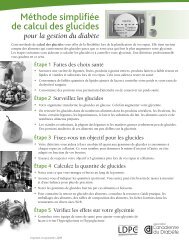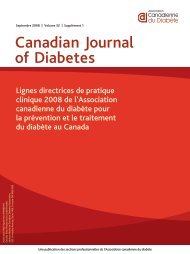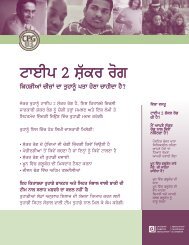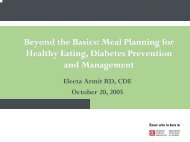2008 Clinical Practice Guidelines - Canadian Diabetes Association
2008 Clinical Practice Guidelines - Canadian Diabetes Association
2008 Clinical Practice Guidelines - Canadian Diabetes Association
You also want an ePaper? Increase the reach of your titles
YUMPU automatically turns print PDFs into web optimized ePapers that Google loves.
<strong>2008</strong> CLINICAL PRACTICE GUIDELINES<br />
S124<br />
out diabetes. Generally, heart failure in people with diabetes<br />
should be treated similarly to those without diabetes, although<br />
comorbidities such as renal dysfunction may be more prevalent<br />
in people with diabetes and may influence heart failure<br />
drug doses and monitoring of therapy. Treatment choices for<br />
diabetes (i.e. dietary and/or pharmacologic therapy) each<br />
have advantages and disadvantages in heart failure patients.<br />
Metformin<br />
Metformin is an effective oral antihyperglycemic agent but,<br />
based on isolated case reports and a biochemical rationale for<br />
a risk of lactic acidosis (16-18), it is approved for use under<br />
a warning in the setting of several conditions, including heart<br />
failure.Two large meta-analyses and a smaller case series have<br />
evaluated the occurrence and outcomes of lactic acidosis<br />
with the use of metformin or other antihyperglycemic agents<br />
in over 40 000 subjects, including those with heart failure.<br />
Only subjects with a serum creatinine of up to 150 µmol/L<br />
were included in the meta-analyses, and up to 200 µmol/L in<br />
the case series. Lactic acidosis was not increased, and cardiovascular<br />
outcomes in heart failure patients taking metformin<br />
were better than in those taking other antihyperglycemic<br />
agents.The current evidence suggests that patients with heart<br />
failure fare at least as well, if not better, with metformin than<br />
with other antihyperglycemic agents if they have only mild to<br />
moderate renal dysfunction (estimated glomerular filtration<br />
rate [eGFR] >30 mL/min). As such, metformin should still<br />
be considered as first-line therapy in heart failure patients<br />
with mild to moderate renal dysfunction (16-18).<br />
Thiazolidinediones<br />
Thiazolidinediones (TZDs) are known to cause fluid retention,<br />
although this is generally mild. Recent studies suggest that this<br />
is not a direct toxic effect on the myocardium.The Prospective<br />
Pioglitazone <strong>Clinical</strong> Trial In Macrovascular Events (PROAC-<br />
TIVE) study of pioglitazone in individuals at risk of cardiac<br />
ischemic events showed that TZDs were associated with fewer<br />
cardiac ischemic events, but at the cost of an increase in heart<br />
failure hospitalizations (2% absolute excess over 2.8 years, or<br />
5000 subjects, a significant reduction<br />
of new glucose intolerance and cardiovascular events<br />
(0.8% absolute reduction) were seen with rosiglitazone, but a<br />
small excess of new-onset heart failure was also observed<br />
(0.4% absolute excess) (20). A recently completed randomized<br />
trial comparing the efficacy of rosiglitazone, metformin or<br />
glyburide monotherapy in people with type 2 diabetes reported<br />
a greater treatment failure rate of monotherapy with glyburide<br />
or metformin compared to rosiglitazone, but an<br />
increase in reported heart failure with rosiglitazone. When<br />
only adjudicated events were considered, there was no signifi-<br />
cant difference in cardiovascular-related or heart failure-related<br />
mortality in any arm (21). Recent reports suggest that the<br />
fluid retention can be safely managed with careful observation,<br />
taking care not to increase diuretic therapy in the absence of<br />
either symptoms or signs of central volume overload rather<br />
than just peripheral edema (17,18). In an addition to product<br />
monographs in November 2007, Health Canada advised that,<br />
“Treatment with all rosiglitazone products is now contraindicated<br />
in patients with any stage of heart failure, (i.e. NYHA<br />
Class I, II, III or IV).” (22) A recent meta-analysis (23) has not<br />
confirmed any difference in the risk of congestive heart failure<br />
between rosiglitazone and pioglitazone. Glitazones may be<br />
used cautiously in patients with stable mild heart failure if close<br />
specialist monitoring is available, but should not be used in<br />
patients with unstable or severe heart failure.<br />
A detailed discussion of the rationale and evidence for the<br />
treatment approach to heart failure patients is available in the<br />
<strong>Canadian</strong> Cardiovascular Society consensus recommendations<br />
(http://www.hfcc.ca) (1,24).<br />
RECOMMENDATIONS<br />
1. Individuals with diabetes and heart failure should receive the<br />
same heart failure therapies as those identified in the evidence-based<br />
<strong>Canadian</strong> Cardiovascular Society heart failure<br />
recommendations (http://www.hfcc.ca) [Grade D, Consensus].<br />
2. Unless contraindicated, metformin may be used in people<br />
with type 2 diabetes and heart failure [Grade C, Level<br />
3 (16,17)]. Metformin should be temporarily withheld if<br />
renal function acutely worsens, and should be discontinued<br />
if renal function significantly and chronically worsens<br />
[Grade D, Consensus].<br />
3. Physicians should be aware that people taking TZDs are<br />
at increased risk of heart failure and may present with<br />
symptoms such as increased dyspnea and peripheral<br />
edema [Grade B, Level 2 (19,20)].<br />
4. In people with diabetes and heart failure and an eGFR<br />











